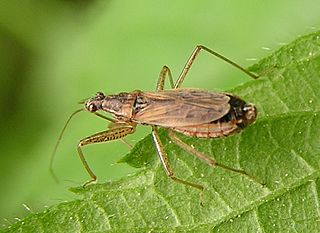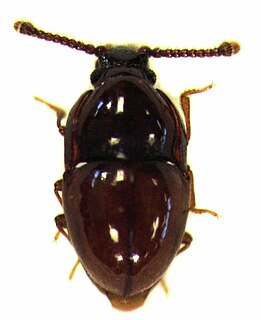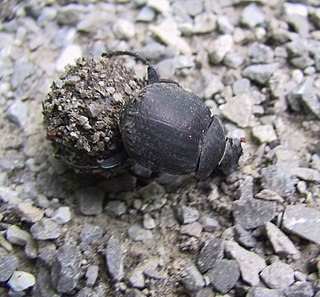
The Integrated Taxonomic Information System (ITIS) is an American partnership of federal agencies designed to provide consistent and reliable information on the taxonomy of biological species. ITIS was originally formed in 1996 as an interagency group within the US federal government, involving several US federal agencies, and has now become an international body, with Canadian and Mexican government agencies participating. The database draws from a large community of taxonomic experts. Primary content staff are housed at the Smithsonian National Museum of Natural History and IT services are provided by a US Geological Survey facility in Denver. The primary focus of ITIS is North American species, but many biological groups exist worldwide and ITIS collaborates with other agencies to increase its global coverage.

The insect family Nabidae contains the damsel bugs. There are over 500 species in 20 genera. They are soft-bodied, elongate, winged terrestrial predators. Many damsel bugs catch and hold prey with their forelegs, similar to mantids. They are considered helpful species in agriculture because of their predation on many types of crop pests.

Anthocoridae is a family of bugs, commonly called minute pirate bugs or flower bugs. Worldwide there are 500-600 species.

Cryptophagidae is a family of beetles with representatives found in all biogeographic realms. Members of this family are commonly called silken fungus beetles and both adults and larvae appear to feed exclusively on fungi although in a wide variety of habitats and situations, such as rotting wood and shed animal fur and feathers. These beetles vary from about 1 to 11 millimeters long, and usually have an oval body shape with a slight "waist".

Anthribidae is a family of beetles also known as fungus weevils. The antennae are not elbowed, may occasionally be longer than the body and thread-like, and can be the longest of any members of Curculionoidea. As in the Nemonychidae, the labrum appears as a separate segment to the clypeus, and the maxillary palps are long and projecting.

The Catalogue of Life is an online database that provides the most comprehensive and authoritative index of known species of animals, plants, fungi, and microorganisms. It was created in 2001 as a partnership between the global Species 2000 and the American Integrated Taxonomic Information System. The Catalogue interface is available in twelve languages and is used by research scientists, citizen scientists, educators, and policy makers. The Catalogue is also used by the Biodiversity Heritage Library, the Barcode of Life Data System, Encyclopedia of Life, and the Global Biodiversity Information Facility. The Catalogue currently compiles data from 168 peer-reviewed taxonomic databases, that are maintained by specialist institutions around the world. As of 2019, the Catalogue lists 1,837,565 of the world's 2.2m extant species known to taxonomists on the planet at present time.

Myopsocidae is a family of mouse-like barklice, belonging to the infraorder Psocetae of the order Psocoptera. This family is closely related to Psocidae, with which it shares similar wing-venation, but from which it is distinguished by three-segmented tarsi.

Deltochilum is a genus of dung beetles in the family Scarabaeidae. There are at least 100 described species in Deltochilum.

Clivina is a genus of ground beetle native to the Palearctic, the Nearctic, the Near East and North Africa. There are at least 580 described species in Clivina.

Lixus is a genus of true weevils in the beetle family Curculionidae. There are at least 950 described species in Lixus.

The Ropalomeridae are a family of acalyptrate flies.

Periscelididae is a family of flies.

Valenzuela is a genus of psocoptera in the family Caeciliusidae, the lizard barklice. Some species are extinct and date to the Eocene of Poland or Russia. There are at least 300 described species in Valenzuela.

Anomalini is a tribe of shining leaf chafers in the family Scarabaeidae. There are about 1300 described species in Anomalini worldwide, including 60 in North America.
Dichelonyx is a genus of May beetles and junebugs in the family Scarabaeidae. There are at least 30 described species in Dichelonyx.
Leptohoplia is a genus of shining leaf chafers in the family of beetles known as Scarabaeidae. There are at least two described species in Leptohoplia.

Chaoborus punctipennis is a species of phantom midges.
Baconia is a genus of clown beetles in the family Histeridae. There are at least 110 described species in Baconia.
Ablaberoides testaceipennis are a species of beetles discovered in 1924. No subspecies are listed on Catalogue of Life.

Ablaberoides is a genus of beetles within the family Melolonthidae.














